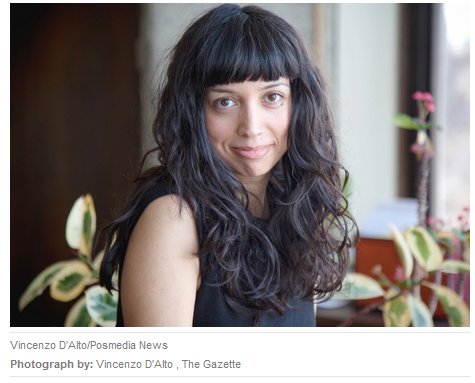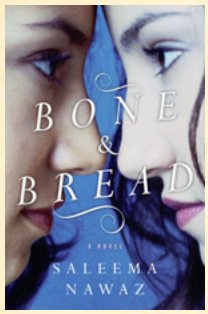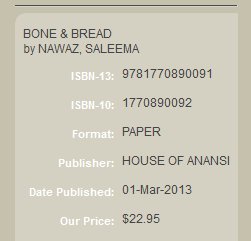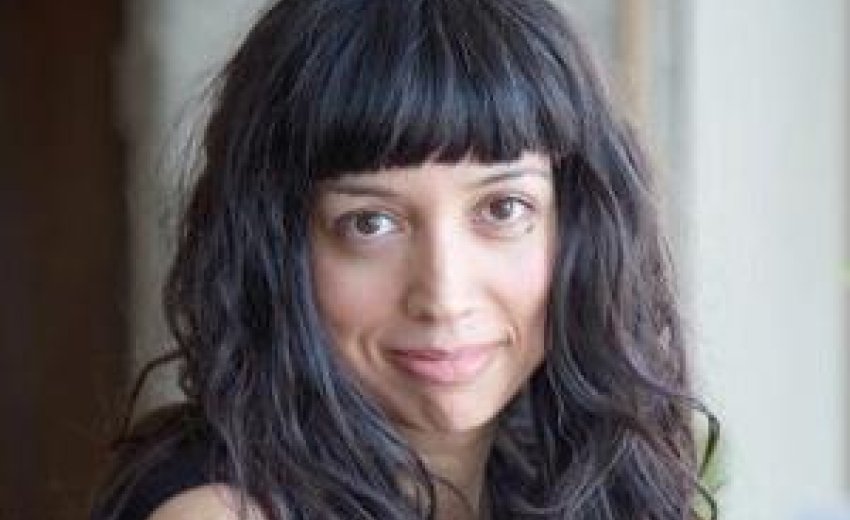Book Review
March 27, 2013:

Bone & Bread
Most sisters are close. Beena and Sadhana Singh are something else again.
The heroines of Saleema Nawaz’s new novel Bone & Bread aren’t twins, though in many ways they may as well be. They were born exactly two years apart, and share a further bond as orphans: their Sikh father, proprietor of a Mile End bagel shop, and their New Age-inclined mother both died when the girls were young.
Under the subsequent guardianship of their strict Sikh uncle, the girls are forced to rely on each other and identify almost mystically — to the point where, as teenagers, they stop having their periods at the same time, but for two very different reasons. Beena has become pregnant after a tryst with one of the “bagel boys” in the shop downstairs, while Sadhana has reached a crossroads in her dual obsessions of extreme athletic pursuits and anorexia.
The novel opens with Beena narrating as the adult mother of a 14-year-old son; we know from the start that Sadhana has recently died, and we suspect that the death had something to do with her eating disorder. Beena inevitably finds herself looking back over the sisters’ shared life, groping for explanations, working her way through her own sense of guilt at what happened, and dealing with her son’s growing desire to make contact with his absent (and very problematic) father.
Nawaz draws the core relationships with immaculately rendered delicacy; she gives the narrative time and space to unfold and evolve in a way that carries uncanny emotional punch. She also invests the novel with a vivid sense of place: Many sections are as Mile End-specific as any fiction since early Mordecai Richler, though the neighbourhood has changed a lot since Duddy Kravitz ran its streets.
Bone & Bread fulfils the promise of Nawaz’s acclaimed story collection debut, Mother Superior, and then some. It is one of the events of the year on the Canadian fiction scene.
Nawaz, 32, lives with her husband and 11-year-old stepdaughter in Montreal. She grew up in Ottawa, the only child of a single mother who worked as a nursing assistant and health-care coordinator. (Her Indian father went back to his home country when Nawaz was two.) Reading and the desire to write were always present: she recalls a room in her mother’s house with shelves along one wall from floor to ceiling.
“There were Harlequin paperbacks, medical textbooks, Catholic catechisms, lives of the saints, mystery novels, and some classics. I learned how to read and even write a little before I started kindergarten, though, so I had lots of books of my own, too. Most of which I still have.”
The writing bug, she says, can be traced directly to an epiphany that happened in Grade 1. “We had these little notebooks that were half-blank and half-lined. They were for writing stories and illustrating them. I was impatient with (the illustrating) aspect, because I couldn’t make the pictures do what I wanted in the way that I could with the words.”
Nawaz had a Catholic childhood of a kind that was already growing rare by the time she was born. “From comparing notes with other people, it seems like my Catholic upbringing was more intense than the average,” she says. “My mother and my grandmother are very devout Catholics. We had a framed photo of the pope in the living room. And my mother volunteered at the rectory, where the priests lived, so I sometimes went with her there. We also went on pilgrimages to Ste-Anne-de-Beaupré every summer, where you go to mass five times a day.”
Though she describes herself now as “beyond lapsed,” Nawaz says some aspects of those formative years have lingered, even in her work. “I think being raised Catholic predisposes you to a kind of magical thinking that can bleed into paranoid superstitiousness, as it does for Beena and Sadhana. It’s just occurring to me now. I definitely feel susceptible to that way of thinking, even though I know better.”
After getting a degree in English at Carleton University, Nawaz went to Winnipeg to pursue an MA at the University of Manitoba; some of what she wrote there formed the basis of Mother Superior, published by Freehand Books in 2008, by which time she was living in Montreal and working in the philosophy department at McGill.
While that debut was being prepared, she won the Journey Prize for one of its stories, My Three Girls. “Sometimes, when I think about it, I still don’t quite believe it,” she recalls of her Journey recognition, an accolade that has served many of its winners as a career launching pad. “When I was writing short stories and sending them out, I was reading the Journey Prize Anthologies in awe. Even hearing that Prairie Fire was nominating my story kind of blew me away.”
Another of the debut’s stories, Bloodlines, became the seed for Bone & Bread when Nawaz decided to pick up its characters’ narratives 20 years later. “The (original) story was one of those ideas that kind of arrives in a flurry … the kind that makes writers talk about always wanting to carry around a pen and notebook,” she says. “Basically, I really wanted to write a novel, and the logical place to start seemed to be this story I had that I was already having trouble keeping down to a mere 5,000 words.”
Bone & Bread feels so lived and immediate that many might assume an autobiographical element that isn’t really there: this novel of an intense sibling relationship sprang from the mind of an only child.
It’s fiction, after all, as Nawaz emphasizes. “Writing seems to come with this paradoxical responsibility. You have to make everything up but everything has to be true. I felt like I knew this family and these characters really well, and the main challenge in writing it was the same challenge one faces in writing anything ... sticking with it and following where their story would lead. Doing the work, in other words. I don’t have a sister, but I have a lot of female friends. So you can take a hint of a feeling and imagine where it might go in a different world, a different life, a different set of circumstances.”
Much of the novel’s suspense grows from the essential enigma of the roots of eating disorders; as Beena tries to figure out what makes her sister tick and what finally killed her, her mystification and frustration mirrors the reader’s.
“It’s true that at root (anorexia) is a complex disorder that can have lots of causes that are hard to tease apart, even or especially for the people who are suffering from it,” Nawaz says. “So there is a mystery at the heart of it, and in the heart of the book, too. Which is not to say that I felt as mystified as Beena does. I don’t mean that I had an eating disorder, more that, again, one can sometimes have a flash of a feeling and where it could go.”
Research played its part, too, Nawaz points out. “I read through personal accounts of anorexia, as well as families of people who have had it. There are also lots of these ‘thinspiration’ subcultures online. It’s sometimes called pro-ana, short for pro-anorexia, or pro-mia, for bulimia. Girls share skinny photos and tips about how to keep their fasts going, and how to avoid questions about what you’re eating or not eating. This is not an easy disease. I spoke to someone who was reading the novel, who has a sister with an eating disorder, who struggled for years and years through relapse and recovery and happily her sister is okay now, but it is partially through the intervention of a supportive partner. To this day, she has lost the ability to tell when she’s hungry or full, or what a normal portion size is.”
For all its focus on eating disorders and other hot-button issues, Bone & Bread never reads as an “issue” novel; its topicality is not the kind that will date, growing as it does organically out of the characters’ personal lives and conflicts. “If someone had said to me: ‘Would you like to write a novel that deals with immigration, racism, and French-English relations in Quebec?’ I would have politely said, ‘No, thank you’ and backed away,” Nawaz says. “But I think these issues are just part of living in Quebec today, so I’m not surprised they found their way in.”
As for what’s coming next, Nawaz mentions several projects, chief of which is a YA novel inspired by her lifelong love of girl detective fiction. When I make the shameful confession that I used to like Nancy Drew more than the Hardy Boys, she does me one better and says she always liked Trixie Belden more than Nancy Drew. Furthering her nerd credentials, she has taken an active part in the online Veronica Mars Movie Kickstarter Project. “It’s my second favourite show ever, after Buffy,” she says. Singing is another passion: she’s a soprano who performs regularly with the McGill Choral Society.
Right now and for the immediate future, of course, Nawaz has the little matter of next-big-thing buzz to deal with: she is the cover star of the upcoming issue of Quill & Quire, and plenty more like that is sure to come. “It feels like winning a lottery, because there are so many good books coming out, and it’s so easy to have a book kind of disappear, for no good reason,” she says of the star treatment. “I think writers have to be ready (for attention and criticism), but I think part of the way that lots of us build that up is by pretending or wilfully forgetting that anyone is ever going to read this thing you wrote.”
Those powers of pretending, you get the feeling, are about to be put to a severe test.
Bone & Bread by Saleema Nawaz is launching on Thursday, March 28, with a dual event. The Monday Night Choir performs at Le Dépanneur, 206 Bernard St. W., at 7 p.m.; a wine-and-cheese and a conversation between Saleema Nawaz and Drew Nelles, editor-in-chief of Maisonneuve magazine, takes place across the street at Librairie Drawn & Quarterly, 211 Bernard St. W., at 7:30 p.m.
[email protected]:note> © Copyright (c) The Calgary Herald

"Nawaz must stay up all night sharpening her quills and flinging practice shots at her story's bull's-eye. How else to account for language sliced with such beautiful discernment and precision?" |
 Beena and Sadhana are sisters who share a bond that could only have been shaped by the most unusual of childhoods -- and by shared tragedy. Orphaned as teenagers, they have grown up under the exasperated watch of their Sikh uncle, who runs a bagel shop in Montreal's Hasidic community of Mile End. Together, they try to make sense of the rich, confusing brew of values, rituals, and beliefs that form their inheritance. Yet as they grow towards adulthood, their paths begin to diverge. Beena catches the attention of one of the "bagel boys" and finds herself pregnant at sixteen, while Sadhana drives herself to perfectionism and anorexia. Beena and Sadhana are sisters who share a bond that could only have been shaped by the most unusual of childhoods -- and by shared tragedy. Orphaned as teenagers, they have grown up under the exasperated watch of their Sikh uncle, who runs a bagel shop in Montreal's Hasidic community of Mile End. Together, they try to make sense of the rich, confusing brew of values, rituals, and beliefs that form their inheritance. Yet as they grow towards adulthood, their paths begin to diverge. Beena catches the attention of one of the "bagel boys" and finds herself pregnant at sixteen, while Sadhana drives herself to perfectionism and anorexia.
When we first meet the adult Beena, she is grappling with a fresh grief: Sadhana has died suddenly and strangely, her body lying undiscovered for a week before anyone realizes what has happened. Beena is left with a burden of guilt and an unsettled feeling about the circumstances of her sister's death, which she sets about to uncover. Her search stirs memories and opens wounds, threatening to undo the safe, orderly existence she has painstakingly created for herself and her son. Heralded across Canada for the power and promise of her debut collection, Mother Superior, Nawaz proves with Bone and Bread that she is one of our most talented and unique storytellers. Source |
